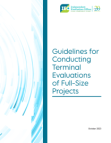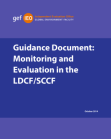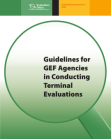The Global Environment Facility (GEF) Evaluation Policy (2019) requires GEF Agencies to evaluate GEF-financed projects at completion. A terminal evaluation provides a comprehensive and systematic account of project performance, factors that affect performance, implementation, and project…
Guidelines for Conducting Terminal Evaluations of Full‑Size Projects 2023
Guidelines for Conducting Program Evaluation 2023
The Global Environment Facility (GEF) Evaluation Policy (2019) requires that the lead GEF Agency will evaluate a program at the end of its implementation to provide a comprehensive and systematic account of its performance and the factors that affect performance. Program evaluations are expected…
Guidelines for Reporting on Completed Enabling Activities 2023
An enabling activity is a project for the preparation of a plan, strategy, or report to fulfill commitments under the relevant Global Environment Facility (GEF) environmental convention. The GEF Evaluation Policy (2019) requires that GEF-financed projects be evaluated at the end of…
GEF Evaluation Policy 2019
The GEF addresses global environmental issues while supporting national sustainable development initiatives. It does so through a partnership involving 184 member countries, 18 Agencies, recipient countries, civil society organizations, and the private sector. In such a large partnership, a…
GEF Monitoring and Evaluation (M&E) in the LDCF/SCCF 2014
The GEF Monitoring and Evaluation (M&E) Policy applies to the Least Developed Countries Fund (LDCF) and the Special Climate Change Fund (SCCF). This Guidance Document provides LDCF/SCCF stakeholders with direction on how to monitor and evaluate results within the overarching…
Guidelines for GEF Agencies in Conducting Terminal Evaluations 2008
When a project is closing, the Implementing or Executing Agency conducts a terminal evaluation. The main purpose of such evaluations is to review the implementation process and achievement of results and draw lessons.
The Guidelines for Terminal Evaluations provide…





